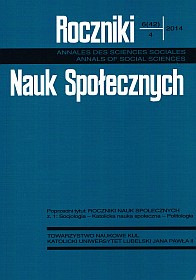Pierre Bourdieu and Sociology of Intellectuals. A Ttheoretical Framework for the Analysis of the Intellectual Field, With Special References to Poland
Abstract
The main goal of the article is to recognize the presence and involvement of Polish artists in public life after 1989. By defining them as intellectuals, the author puts forward a thesis about the existence of an influential group of well-educated people who broaden the well-known sociological categories such as the “intelligentsia,” “elites,” “middle class,” or “experts.” Defined in accordance with the operational definition – proposed after a thorough study of multilingual sources (including Polish studies on the intelligentsia) – Polish intellectuals as politically engaged creators of culture are a clear social category, present in the Polish public life and shaping its ideas.
References
Ash T.G., Prague: Intellectuals and Politics, The New York Review of Books” 42(1), 12 I 1995.
Bourdieu P., Fourth Lecture. Universal Corporatism: The Role of Intellectuals in the Modern World, Poetics Today”, 12(1991), nr 4, s. 655-669.
Bourdieu P., Homo academicus, Cambridge: Polity Press, 1988.
Bourdieu P., Intellectual field and creative project, „Social Science Information” 8(2), 1969, s. 89-199.
Bourdieu P., Practical reason, s. 1-13; tenże, Distinction: A Social Critique of the Judgement of Taste, Cambridge: Harvard University Press 1984, s. 466-484.
Bourdieu P., Practical Reason: On the Theory of Action, Stanford: Stanford University Press 1998, s. 31-34.
Bourdieu P., Sociology in question, London: Sage Publications 1993, s. 39.
Bourdieu P., The Field of Cultural Productions. Essays on Art and Literature, New York: Columbia University Press 1993, s. 63.
Bourdieu P., The Rules of Art. Genesis and Structure of the Literary Field, Stanford: Stanford University Press 1996.
Bourdieu P., The Social Space and the Genesis of Groups, „Theory and Society” 14(1985), nr 6, s. 723-724.
Bourdieu P., Wacquant L.J.D., An Invitation to Reflexive Sociology, Chicago: University of Chicago Press 1992, s. 94-114.
Camic Ch., Gross N., The New Sociology of Ideas, w: The Blackwell Companion to Sociology, J.R. Blau (ed.) Malden-Oxford-Carlton: Blackwell 2004, s. 241-242, 248-249.
Collini S., Public Moralist. Political Thought and Intellectual Life In Britain 1850-1930, Oxford: Clarendon Press 1991, s. 49-51.
Conner T., The Dreyfus Affair and the Emergence of the French Public Intellectual, European Studies Conference Selected Proceedings, 2006, http://www.unomaha.edu/esc/2006papers.html [dostęp: 12 IX 2014], s. 3.
Eyerman R., Between Culture and Politics – Intellectuals in Modern Society, Cambridge: Polity Press 1994, s. 30, 241-242.
Fligstein N., Social Skill and the Theory of Fields, „Sociological Theory” 19/2(2001), s. 105-125.
Foucault M., Politics Philosophy, Culture: Interviews and Other Writings, 1977-1984, L.D. Kritzman (ed.), New York: Routlage 1988, s. 265.
Furedi F., Gdzie się podziali wszyscy intelektualiści?, Warszawa: PIW 2004 [F.Furedi, Where Have All the Intellectuals Gone?, New York: Bloomsbury Academic 2005].
Glotz P., Die beschleunigte Gesellschaft. Kulturkämpfe im digitalen Kapitalismus,München: Verlag Kindler 1999.
Gourgouris S., Intellectuals, Public, w: International Encyclopedia of the Social Sciences. 2nd Edition, W.E. Darity Jr. (red.), Macmillan 2008, vol. 4, s. 68-69.
Kołakowski L., Intelektualiści: w: tenże, Czy diabeł może być zbawiony i 27 innych kazań, Kraków: Znak 2012, s. 177.
Król M.,Filozofia polityczna, Kraków: Znak 2008, s. 146-151.
Kurzman Ch., Owen L., The Sociology of Intellectuals, „Annual Review of Sociology” 2002, nr 28.
Misztal B., Intellectuals and Public Good, New York: Cambridge University Press 2007, s. 20.
Rousseau J.J., Emile, OC, IV, s. 645.
Sapiro G., Forms of Politicization in the French Literary Field, „Theory and Society” 32, nr 5/6, s. 641.
Schumpeter J., Capitalism, Socialism and Democracy, London: Routlage 2013.
Sdvižkov D., Epoka inteligencji. Historia porównawcza warstwy wykształconej wEuropie, Warszawa: Neriton 2011.
Sewell Jr. W.H., A Theory of Structure: Duality, Agency, and Transformation, „American Journal of Sociology” 98(1992), nr1, s. 13-17 [1-29].
Szczepański J., Odmiany czasu teraźniejszego, Warszawa: Książka i Wiedza 1973, s. 106.
Szczepański J., Zakończenie, w: Wykształcenie a pozycja społeczna inteligencji, J.Szczepański (ed.), vol. II, Łódź: PWN 1960, s. 448-450.
Wacquant L., For a Socio-Analysis of Intellectuals: On „Homo Academicus”, „Berkeley Journal of Sociology” 34(1989), s. 4.
Wacquant L., Pointers on Pierre Bourdieu and Democratic Politics, „Constellations. An International Journal of Critical and Democratic Theory” 11(2004), nr 1, s.9-10.
Copyright (c) 2014 Roczniki Nauk Społecznych

This work is licensed under a Creative Commons Attribution-NonCommercial-NoDerivatives 4.0 International License.


